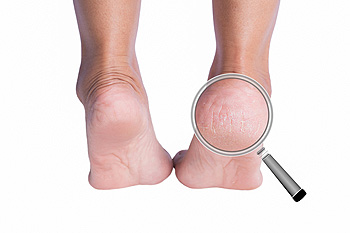Is There a Link Between Vitamin B-3 Deficiency and Cracked Heels?
Tuesday, 13 February 2024 00:00
Vitamin B-3, also known as niacin, plays a vital role in maintaining healthy skin and overall well-being. A deficiency in this essential nutrient can lead to various skin issues, including cracked heels. Cracked heels, characterized by dry, fissured skin around the edges of the heel, often result from inadequate moisture retention and weakened skin integrity. Vitamin B-3 deficiency exacerbates this condition by impairing the skin's ability to retain moisture and regenerate cells effectively. Incorporating niacin-rich foods such as meat, fish, nuts, and fortified cereals into the diet can help prevent vitamin B-3 deficiency and alleviate cracked heels. Understanding the connection between vitamin B-3 deficiency and cracked heels underscores the importance of maintaining a balanced diet and proper skin care regimen for optimal foot health. If you have developed cracked heels, it is suggested that you consult a podiatrist for successful treatment methods, in addition to determining if there is an adequate amount of vitamin B-3 in your daily food intake, and how it may relate to cracked heels.
Cracked heels are unsightly and can cause further damage to your shoes and feet. If you have any concerns, contact Dr. Ronald K. Olm from Grand Traverse Foot & Ankle Center. Our doctor can provide the care you need to keep you pain-free and on your feet.
Cracked Heels
Cracked heels appear unappealing and can make it harder for you walk around in sandals. Aside from looking unpleasant, cracked heels can also tear stockings, socks, and wear out your shoes. There are several methods to help restore a cracked heel and prevent further damage.
How Do You Get Them?
Dry skin is the number one culprit in creating cracked heels. Many athletes, walkers, joggers, and even swimmers suffer from cracked heels. Age and skin oil production play a role to getting cracked heels as well.
Promote Healing
Over the counter medicines can help, especially for those that need instant relief or who suffer from chronic dry feet.
Wear Socks – Wearing socks with medicated creams helps lock in moisture.
Moisturizers – Applying both day and night will help alleviate dryness which causes cracking.
Pumice Stones – These exfoliate and remove dead skin, which allows for smoother moisturizer application and better absorption into the skin.
Change in Diet
Eating healthy with a well-balanced diet will give the skin a fresh and radiant look. Your body responds to the kinds of food you ingest. Omega-3 fatty acids and zinc supplements can also revitalize skin tissue.
Most importantly, seek professional help if unsure how to proceed in treating cracked heels. A podiatrist will help you with any questions or information needed.
If you have any questions, please feel free to contact one of our offices located in Traverse City and Kalkaska, MI . We offer the newest diagnostic and treatment technologies for all your foot care needs.





